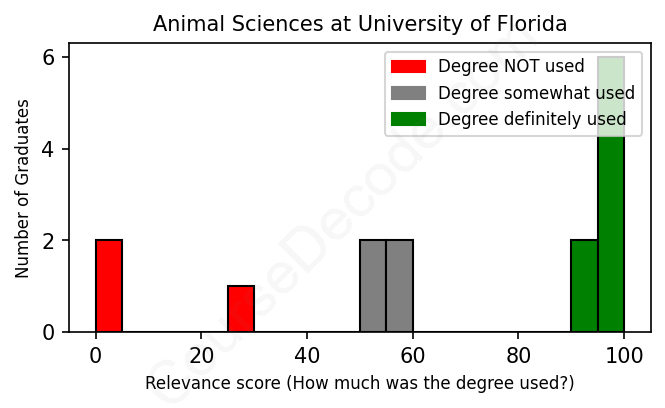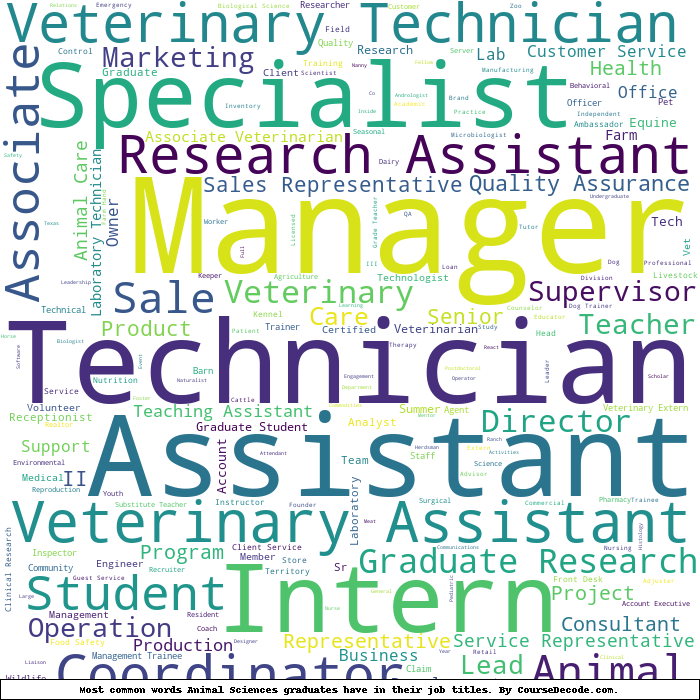
First, some facts. Of the Animal Sciences graduates from University of Florida we've analyzed , here's how many have used (or NOT used) their degree in their career:

These are estimates based on AI analysis of 15 LinkedIn profiles (see below).
The verdict? Slightly above average. Overall, with an average relevance score of 68%, Animal Sciences graduates from University of Florida have a slightly higher likelihood (+1%) of finding work in this field compared to the average graduate across all fields:
And for comparison, here's the chart for all profiles we've looked at across all degrees.
Also, after graduating, 40% of these graduates have pursued further education other than another Bachelor's degree (such as a Masters degree or other), compared to the average across all profiles of 35%. This suggests you may need more than just a Bachelors degree to be competitive as a Animal Sciences graduate.
See the details:
|
Relevance score: 4% We think this person has NOT gone into a career related to their degree. We think this person has NOT gone into a career related to their degree.
DEGREE INFOGraduated in 2013 from University of Florida with a Bachelor's degree in Animal Sciences. No other secondary education since. JOB HISTORY SINCE GRADUATIONFarm Consultant Sparr Building and Farm Supply Jul 2013 - Aug 2014 Casualty Claims Adjuster  Nationwide Sep 2014 - Aug 2020 Arbitration Specialist  Nationwide Sep 2020 - Sep 2023 Property Subrogation Specialist II  Nationwide Sep 2023 - Present Mortage Loan Originator  Harris Capital Mortgage Group, LLC Jan 2024 - Present ABOUTNo information provided. |
The top 10 most common jobs done by the graduates we've analyzed (ranked most common to least) are:
From what I've seen, most graduates from the University of Florida who studied Animal Sciences have ended up in jobs that are pretty closely tied to their degrees. A lot of them have taken roles in veterinary clinics and hospitals, where they get to apply their knowledge directly with animal care. Roles like Veterinary Assistant, Veterinary Technician, and various managerial positions at animal clinics demonstrate a strong alignment with the skills and knowledge they gained from their studies. Additionally, many have found opportunities in pet resorts and animal care facilities, which leverage their understanding of animal behavior and health management. The majority of these positions directly relate to Animal Sciences, showcasing just how versatile the degree can be in the job market.
That said, not every job has been directly related to their field. Some graduates have ended up in roles that are more business-focused or administrative, like sales, marketing, and customer service positions, which don’t require deep knowledge of Animal Sciences on a daily basis. For instance, jobs like Independent Consultant and Insurance Agent don't really utilize any animal-specific skills. Overall, while it’s clear that many graduates have channeled their education into relevant positions within the animal care field, there are also quite a few who have ventured away from that direct path. So, it’s a mixed bag when it comes to the relevance of their jobs to Animal Sciences!
Here is a visual representation of the most common words in job titles for Animal Sciences graduates (this is across all Animal Sciences graduates we've analyzed, not just those who went to University of Florida):

Graduates with a degree in Animal Sciences from the University of Florida have generally found themselves navigating a variety of career paths after graduation, often linking back to their field of study. Many of those who graduated in the earlier years, particularly around 2010, have taken positions that leverage their education directly, such as veterinary managers, nutritionists, and operations directors in animal-related businesses. In the first few years post-graduation, it's not uncommon to see roles as veterinary assistants, research assistants, or even management trainees in pet care and animal health organizations, emphasizing hands-on experience in the animal care sector.
However, the longer-term career trajectories show a mixed picture. While some have successfully advanced to senior roles within veterinary and animal care fields, others have ventured into unrelated areas like claims adjusting or education, indicating a bit of a drift from their initial focus on animal sciences. Those who stayed in the veterinary and pet care sectors seem to have carved out successful niches, climbing the ranks to positions that include district managers and technical service roles. On the flip side, there are instances of graduates who have taken paths that don't directly align with their degree, hinting at a broader range of opportunities or perhaps taking advantage of market demands outside of their field. Overall, while many find rewarding careers in animal-related industries, there is potential for some to explore more diverse professional avenues, leading to varied outcomes depending on individual choices and market conditions.
Honestly, a Bachelor’s degree in Animal Sciences at the University of Florida can be pretty challenging, but it really depends on what you’re used to. You're looking at a mix of biology, chemistry, and hands-on animal care, which can be super engaging if you love working with animals, but it also requires a solid commitment to studying and understanding some complex concepts. While it’s not the hardest degree out there, it definitely has its tough spots, especially if you’re diving into things like genetics or animal nutrition. If you’re passionate about animals and ready to roll up your sleeves, you’ll probably find it manageable, but just know that you’ll need to put in the effort.
Most commonly, in the LinkedIn profiles we've looked at, it takes people 4 years to finish a Bachelor degree in Animal Sciences.
Looking at the career paths of these University of Florida Animal Sciences graduates, it seems like some of them have found decent-paying jobs, while others might be scraping by. For instance, roles like Veterinary District Manager and Senior Regional Manager usually come with good salaries, which suggests those folks are likely earning well! However, some others, like veterinary assistants and guest service associates, might not be making that great of a salary, especially when you consider all the hard work in the animal field. Overall, it looks like there's a mix of success stories and a few who might need to keep hustling to make ends meet.
Here is a visual representation of the most common words seen in the "about" section of LinkedIn profiles who have a Bachelor degree in Animal Sciences (this is across all Animal Sciences graduates we've analyzed, not just those who went to University of Florida). This may or may not be useful:

Here are all colleges offering a Bachelor degree in Animal Sciences (ordered by the average relevance score of their Animal Sciences graduates, best to worst) where we have analyzed at least 10 of their graduates:
| College | Score | Count |
|---|---|---|
 Purdue University Purdue University
|
80 | 14 |
 California State Polytechnic University-Pomona California State Polytechnic University-Pomona
|
78 | 13 |
 North Carolina State University North Carolina State University
|
77 | 18 |
 Iowa State University Iowa State University
|
75 | 25 |
 University of Missouri-Columbia University of Missouri-Columbia
|
75 | 12 |
 South Dakota State University South Dakota State University
|
73 | 10 |
 The Ohio State University The Ohio State University
|
71 | 21 |
 University of Florida University of Florida
|
68 | 15 |
 University of Vermont University of Vermont
|
68 | 12 |
 Michigan State University Michigan State University
|
67 | 20 |
 University of California, Davis University of California, Davis
|
66 | 27 |
 University of Illinois at Urbana-Champaign University of Illinois at Urbana-Champaign
|
63 | 16 |
 University of Tennessee, Knoxville University of Tennessee, Knoxville
|
61 | 13 |
 University of Arkansas University of Arkansas
|
60 | 10 |
 California Polytechnic State University-San Luis Obispo California Polytechnic State University-San Luis Obispo
|
59 | 22 |
 University of Wisconsin-River Falls University of Wisconsin-River Falls
|
58 | 10 |
 Texas A&M University Texas A&M University
|
54 | 34 |
 Penn State University Penn State University
|
53 | 14 |
 Texas Tech University Texas Tech University
|
51 | 12 |
 Kansas State University Kansas State University
|
51 | 22 |
 Oklahoma State University Oklahoma State University
|
43 | 16 |